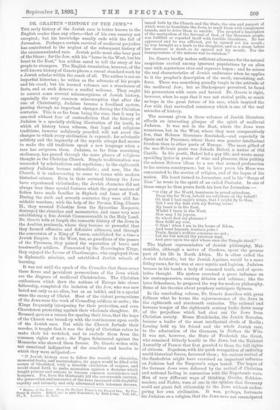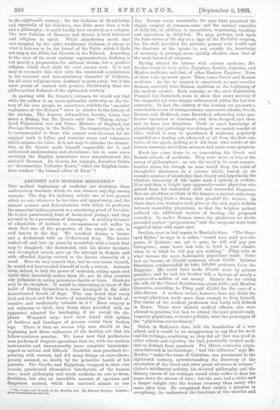DR. GRAETZ'S "HISTORY OF THE JEWS."* THE early history of
the Jewish race is better known to the English reader than any other,—that of his own country not excepted ; but his knowledge usually ends with the fall of Jerusalem. Perhaps a certain survival of media3val prejudice has contributed to the neglect of the subsequent history of the excommunicated race. Jewish pride must also bear part of the blame; for the Jew, with his "home in the West, but his heart in the East," has seldom cared to tell the story of his people to strangers. The English translation, however, of the well-known history of Graetz places a recent standard work by a Jewish scholar within the reach of all. The author is not an impartial historian ; he writes as the advocate of his people and his creed; but his learned volumes are a storehouse of facts, and as such deserve a cordial welcome. They ought to correct some current misconceptions of Jewish history, especially the very common misconception that after the rise of Christianity, Judaism became a fossilised system, passing through no important changes during the Christian centuries. This is so far from being the case, that it may be asserted without fear of contradiction that the history of Judaism is a specially striking illustration of the truth, to which all history bears witness, that legal and religious traditions, however sedulously guarded, will not avert the changes to which every civilisation is exposed ; for scholastic subtlety and the ingenuity of the mystic always find means to make the old traditions speak a new language when a race has outgrown them. Judaism, so far from remaining stationary, has passed through the same phases of religious thought as the Christian Church. Simple traditionalism was succeeded by scholasticism and mysticism ; in the eighteenth century Judaism became rationalistic ; and now, like the Church, it is endeavouring to come to terms with modern historical science. Even in their outward history the Jews have experienced vicissitudes ; the Jewish character did not always bear those special features which the great masters of fiction have made familiar in Shylock and Isaac of York. During the sixth and seventh centuries they were still for- midable warriors ; with the help of the Persian King, Chosru they wrested Palestine from the Byzantine Emperor, destroyed the churches and monasteries, and came very near -establishing a free Jewish Commonwealth in the Holy Land. Dr. Graetz tells at length the romantic history of the Jews in the Arabian peninsula, where they became so powerful that they formed offensive and defensive alliances, and through the conversion of a King of Yemen, established for a time a Jewish Empire. In the West, too, as guardians of the passes of the Pyrenees, they gained the reputation of brave and trustworthy soldiers. Persecuted by the Merovingian Kings, they enjoyed the favour of Charlemagne, who employed them in diplomatic missions, and established Jewish schools of learning.
It was not until the epoch of the Crusades that there arose those fierce and persistent persecutions of the Jews which are the disgrace of mediseval Christendom. The Christian enthusiasm which drew the nations of Europe into closer fellowship, completed the isolation of the Jew, who was now hated not only as an alien, but as an infidel, and in a special sense the enemy of Christ. Most of the violent persecutions of the Jews were the work of Crusading soldiers or mobs ; the Sings frequently interposing for their protection, and even Churchmen protesting against their wholesale slaughter. St. Bernard gave as a reason for sparing their lives, that the hope of the Church was bound-up with the continuance upon earth of the Jewish race. But while the Church forbade their murder, it taught that it was the duty of Christian rulers to make their lot wretched, and to exclude them from the -common rights of men ; the Popes fulminated against the Monarchs who showed them favour. Dr. Graetz writes with not unnatural indignation of the cruelties and insults to which they were subjected:— " If Jewish history were to follow the records of chronicles, memorial-books, and martyrologies, its pages would be filled with scenes of bloodshed, with a horrible exhibition of corpses, and would stand forth to make accusation against a doctrine which taught princes and nations to become common executioners and 'hangmen. For, from the thirteenth till the seventeenth century, the persecution and massacres of the Jews increased with frightful rapidity and intensity and only alternated with inhuman decrees, * Historu of tho Jews. From the Earliest Times to the Present Day, By Pro- fessor H. Bracts. Edited, and In part Translated, by Bella Lawy. Vol,. III , IV., V. London : D. Nutt.
issued both by the Church and the State, the aim and purport of which were to humiliate the Jews, to mark them with conspicuous brands, and to drive them to suicide. The prophet's description of the martyrdom of the Servant of God, of the Messianic people, was fulfilled or repeated itself with terrible literalness. He was oppressed and he was afflicted, yet he opened not his mouth ; he was brought as a lamb to the slaughter, and as a sheep before her shearers is dumb, so he opened not his mouth. For the transgressions of the nations was he stricken."
Dr. Graetz hardly makes sufficient allowance for the natural suspicions excited among ignorant populations by an alien race with mysterious rites and separate hopes ; and he misses the real characteristics of Jewish endurance when he applies to it the prophet's description of the meek, unresisting suf- ferer. There was something grandly tragic in the attitude of the media3val Jew; but as Shakespeare perceived, he faced his persecutors with scorn and hatred. Dr. Graetz is right, however, when he says that it was not stoical pride, so much as hope in the great future of his race, which inspired the Jew with that unrivalled constancy which is one of the real miracles of history.
The account given in these volumes of Jewish literature affords an interesting glimpse of the spirit of mediaaval Judaism. It was not in the East, where the Jews were numerous, but in the West, where they were comparatively few, that Hebrew literature flourished,—and especially in Spain and in Provence, where there was greater intellectual freedom than in other parts of Europe. The most gifted of the neo-Hebraic poets was Jehuda Halevi, a native of Old Castile. In his youth, Halevi led a gay life, and wrote many sparkling lyrics in praise of wine and pleasure, thus putting the solemn Hebrew idiom to a use that seemed profanation to his serious countrymen; but in later years his Muse was consecrated to the service of religion, and of the hopes of his nation. His heart turned to Jerusalem, and in his "Songs of Zion" he wrote in the spirit of an exiled Psalmist. In one of those songs he thus pours forth his love for Jerusalem :— "0 City of the World, beauteous in proud splendour,
From the far West, behold mo solicitous on thy behalf Oh that I had eagle's wings, that I might fly to thee, Till I wet thy dust with my flowing tears !
My heart is in the East, Whilst I tarry in the West.
How may I be joyous, Or whore find my pleasure ?
How fulfil my vow, 0 Zion I when I am in the house of Edorn, And bend beneath Arabia's yoke ? Truly, Spain's welfare concerns me not ; Let me but behold thy precious dust, And gaze upon the spot where once the Temple stood."
The highest representative of Jewish philosophy, Mai- monides, although a native of Cordova, spent the greater part of his life in North Africa. He is often called the Jewish Aristotle ; but the Jewish Aquinas, would be a more fitting name, for he was at once mystic and logician. Judaism became in his hands a body of reasoned truth, and of specu- lative thought. His system exercised a great influence on his contemporaries, causing debates and schisms ; like the later Schoolmen, he prepared the way for modern philosophy. Some of his theories about prophecy anticipate Spinoza.
In the concluding volume, Dr. Graetz describes with great fullness what he terms the rejuvenescence of the Jews in the eighteenth and nineteenth centuries. The rational and humane temper of the eighteenth century broke down many of the prejudices which bad shut out the Jews from Christian society. Moses Mendelsohn, the Jewish Socrates, became a leader of the most intellectual circle of Berlin; Leasing held up his friend and the whole Jewish race, to the admiration of the Germans, in Nathan the Wise. It was not, however, the State of Frederick the Great, who remained bitterly hostile to the Jews, but the National Assembly of France that first granted to them the full rights of citizens. Napoleon, with his quick recognition of enduring world-historical forces, favoured them ; his curious revival of the Sanhedrim might have exercised an important influence on Judaism had the Emperor's reign lasted. The hopes of the German Jews were deferred by the revival of Christian and national feeling in connection with the Napoleonic wars. Men of very different ways of thinking, Goethe, &Meier- macher, and Fichte, were at one in the opinion that Germany could not grant full citizenship to the Jews without endan- gering her own civilisation. It was, perhaps, fortunate for Judaism as a religion, that the Jews were not emancipated in the eighteenth century ; for the Judaism of Mendelsohn, and especially of his followers, was little more than a code and a philosophy ; it could hardly have survived as a religion. The new Judaism of Bernays and Graetz is both historical and religious in spirit. White abandoning much that was accepted by the older traditional Judaism, it clings to what it believes to be the kernel of the Faith, which it finds not only in the Bible, but likewise in the Talmud. According to the view of its most eminent representatives, Judaism is not merely a preparation for rational theism, but a positive religion, which shall abide for ever among men, It is not easy to reconcile this view with the contented acquiescence in the national and non-missionary character of Judaism, for all caste religions seem destined to pass away; but it has more points of contact with positive Christianity than the philosophical Judaism of the eighteenth century.
In parting with Dr. Graetz's volumes, we would say that while the author is an unexceptionable authority on the his- tory of his own people, be sometimes exhibits the "scornful negligence of the Hebrew" when he alludes to the history of the nations. The famous Alexandrian heretic, Arius, was never a Bishop, but Dr. Graetz calls him "Bishop Arius." Lord Palmerston was not Prime Minister of England, but Foreign Secretary, in the forties. The translation is only to be recommended to those who cannot read German, for the original work is fuller, and contains notes and references which enhance its value. It is not easy to criticise the transla- tion, as Dr. Graetz made himself responsible for it, and authorised condensations and alterations ; but in some cases certainly the English translators have misunderstood the author's German. Dr. Graetz, for example, describes Fichte as" der einseitige Vollender Kautz," which the English trans- lator renders "the biassed editor of Kant "!



































 Previous page
Previous page